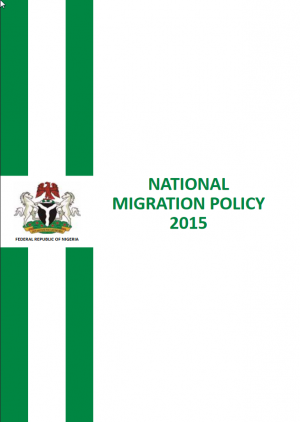There has been increased interest in migration and migration policies in the last decade. Several developments at global, regional, subregional and national levels have raised migration issues to the forefront of the political and policy arenas, emphasizing the need for legal frameworks to curtail irregular migration and maximize the benefits of migration for national development.
At the international level, the 2005 Report of the Global Commission for International Migration, the 2006 and 2013 United Nations High Level Dialogue on International Migration and Development and the annual Global Forum on Migration and Development drew attention to the need to mainstream migration into development. The African Union’s Strategic Framework for a Policy on Migration and the Common Position on Migration and Development at the regional level, as well as the ECOWAS Common Approach on Migration at the subregional level, encouraged member states to formulate national migration policies. At the national level, the Nigeria-EU political dialogue on migration and development highlighted the need to tap into the pool of skilled Nigerian professionals abroad and the remittance flows for national development.
The National Migration Policy has been carefully drafted by Nigerian officials and local experts. It is comprehensive and coherent with existing sectoral policies on youth, health, gender and the National Labour Migration Policy, among others. It also addresses the key issues of migrants’ rights and their contribution to development, and conforms to international standards in its content, objectives and strategies. The process leading to, and through, the review and update of the initial draft was interactive, transparent and inclusive.
The focus is largely on enhancing the positive aspects of an orderly migration regime, through efficient administration and management of the entire migration process, while seeking to minimize the negative implications and impacts on the socioeconomic development of Nigeria.
The policy document is divided into two main sections. The first section addresses core migration issues such as the diaspora, brain drain, remittances, migration and urbanization, irregular migration, border management, forced migration, migrants’ rights and labour migration. After providing policy statements, strategies and objectives on these core migration issues, the policy then covers several cross-cutting themes that deal with migration and its impact on other socioeconomic issues, such as poverty, health, trade and gender.
A detailed Action Plan annexed to the policy document proposes activities to be undertaken by relevant stakeholders for each of the specific objectives sketched out. Importantly, the expected outcomes are also set out in precise terms, to ensure a transparent monitoring of the policy objectives.
The responsibility for the coordination and implementation of this policy is vested in the National Commission for Refugees, Migrants and Internally Displaced Persons (NCFRMI).
- Principles and assumptions
- Nigeria: migration dynamics, trends and patterns (internal and external)
- Rationale for the national policy on migration
- Policy goals, objectives and strategies
- Migration and international cooperation (see also section 4.7.2)
- Migration data and information management
- Funding for migration management
- Institutional frameworks for policy Implementation
